Crackdown Freedom of Speech Now and in the Past
Reddit mascots are displayed at the company’s headquarters in San Francisco.
REUTERS/Robert Galbraith
Social media website Reddit Inc, known for its commitment to free speech on its platform, will crack down on online harassment by banning or suspending users who target others, its CEO Steve Huffman said in an interview.
Huffman told Reuters that it will monitor user reports, add greater filtering capacity, and take a more proactive role in policing its platform rather than relying on community moderators.
Reddit said it had identified hundreds of the “most toxic users” and will warn, ban or suspend them. It also plans to continue to staff up its “Trust and Safety”
Reddit’s moves are the latest step by social media companies to adjust their policies in the wake of a polarizing U.S. election earlier this month in which their websites played a key role.
Facebook said it is reviewing its approach to so-called “fake news” and banning some sites from its advertising network. Twitter is also rolling out new tools to combat abuse.
On Reddit, a channel supporting the Republican party’s U.S. presidential candidate Donald Trump, called r/The_Donald, featured racist and misogynistic comments, fake news and conspiracy theories about Hillary Clinton, along with more mainstream expressions of support for Trump.
Facebook said it is reviewing its approach to so-called “fake news” and banning some sites from its advertising network. Twitter is also rolling out new tools to combat abuse.
Many of those supporting Trump were very active and engaged on the platform, voting up the r/The_Donald conversations so that they became prominent across Reddit, which according to Alexa is the 7th-most-visited site on the internet in the United States.
From what I can see, conservative news is fake news based on Reddit, Facebook and Twitter. There has been no investigation into things like Project Veritas and the tons of WikiLeaks data and other stories reprinted by conservative news groups. They are just fake news because they put the Clintons in a bad light. If these social media companies are calling a story like Project Veritas and WikiLeaks a lie, they need to reexamine the methodology they are going to use. What is amazing no one has contested the many thousands of pages of WikiLeaks or what project Veritas found. It appears that Reddit, Facebook and Twitter are unable to see a gift of information. Over time all of this will be verified probably in court when DNC and Hillary are held accountable.
Another story related to this is by the Daily Mail showing the USA with less Freedom of the Press than several other countries. This is an older story but where is America at these days. What would Freedom of the Press be after the 2016 Election. What if Hillary won?
Many of those supporting Trump were very active and engaged on the platform, voting up the r/The_Donald conversations so that they became prominent across Reddit, which according to Alexa is the 7th-most-visited site on the internet in the United States.In a draft of a blog post to be published Wednesday, Huffman said he had been asked by many Reddit users “to ban r/The_Donald outright, but he had rejected that idea, because “if there is anything about this election that we have learned, it is that there are communities that feel alienated and just want to be heard, and Reddit has always been a place where those voices can be heard.”From what I can see, conservative news is fake news based on Reddit, Facebook and Twitter. There has been no investigation into things like Project Veritas and the tons of WikiLeaks data and other stories reprinted by conservative news groups. They are just fake news because they put the Clintons in a bad light. If these social media companies are calling a story like Project Veritas and WikiLeaks a lie, they need to reexamine the methodology they are going to use. What is amazing no one has contested the many thousands of pages of WikiLeaks or what project Veritas found. It appears that Reddit, Facebook and Twitter are unable to see a gift of information. Over time all of this will be verified probably in court when DNC and Hillary are held accountable.Another story related to this is by the Daily Mail showing the USA with less Freedom of the Press than several other countries. This is an older story but where is America at these days. What would Freedom of the Press be after the 2016 Election. What if Hillary won?So what can we say? Has social media and search engine gods created more or less freedom of the press. With the talk above and the story below from the past I would dare to say, they are slowly destroying it. -danwillie
Daily Mail- Where is the USA going- Old story
By Daily Mail Reporter
Updated: 12:45 EST, 26 January 2012
Why do Britain and America have LESS press freedom than just a year ago?
Countries which pride themselves on free speech slide down international league table
- Britain slides from 19th to 28th place on back of phone hacking, Leveson Inquiry and ‘libel tourists’
- America falls from 20th to 47th after heavy-handed approach to Occupy demonstrators
- Mixed fortunes for Arab Spring countries with Tunisia and Libya rising up the ranks
- But Syria, Bahrain and Yemen fall as dictators use suppression to cling to power
Britain and the United States have dropped down a league table which rates the freedom of the press across the world, it emerged today.
The UK’s slide from 19th to 28th place is partly blamed on fallout from the phone hacking scandal at the News Of The World which prompted the Leveson Inquiry into press ethics.
Researchers from watchdog Reporters Without Borders (RWB), who compiled the World Press Freedom Index, also highlighted liberal libel laws which allow claimants of any nationality to sue in its courts. Libel ‘tourism’ is seen as a way for the richest to clamp down on freedom of expression.
There were also concerns that the police had attempted to extract information from a number of private companies – including Blackberry – to identify looters during the London riots.
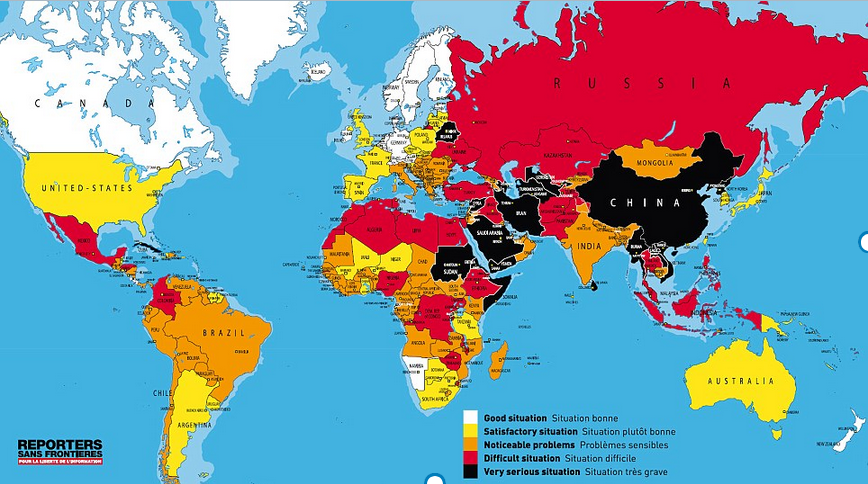
League table: This map of the world shows countries with the most press freedom coloured white and the least coloured black
America’s performance was even worse. It dropped from 20th to 47th position on the back of heavy-handed police tactics at a string of demonstrations against corporate greed.
A number of journalists – as well as protesters – were arrested as the Occupy movement swept across the country.
Heather Blake, from RWB, described the statistics as a worrying trend.
‘The West prides itself on supporting the principles of free speech and freedom of expression,’ she said.
‘If we are going to promote these principles across the rest of the world, then we’ve got to make sure that we uphold them ourselves.’
In the UK’s case, there are fears that the Leveson Inquiry could have further-reaching consequences than anyone initially envisaged.
Long-overdue reform of archaic libel laws would make it more difficult for foreign nationals to sue through British courts However, there is some suggestion that Parliament could delay enacting them into law because of Leveson.
There is also the possibility that the press could face formal regulation for the first time.
The Press Freedom index reflected a year of upheaval, protest and revolution worldwide – though participation in the Arab Spring was no guarantee of an improved rating.
While Tunisia (up to 134 from 164) and Libya (160 to 154) fared well, Egypt dropped from 127 to 166 after a wave of detentions by the army in the wake of the overthrow of Hosni Mubarak.
Syria, Bahrain and Yemen – where dictators clung to power by brutally suppressing protesters – racked up their worst-ever ratings.
Of the 179 countries on the index, Syria came in at 176 (173 in 2010) while Bahrain ranked at 173, a drop of 29 places.
Bottom of the table were Turkmenistan, North Korea and Eritrea. Finland, Norway and the Netherlands claimed the top spots.
The biggest fall was by Malawi, which dropped 67 places to 146 after the suppression of protests last summer.
Niger, meanwhile, leapt spectacularly to 29th place – just one spot below the UK.
‘This year’s index sees many changes in the rankings, changes that reflect a year that was incredibly rich in developments, especially in the Arab world,’ RWB noted.
‘Many media paid dearly for their coverage of democratic aspirations or opposition movements.
‘Control of news and information continued to tempt governments and to be a question of survival for totalitarian and repressive regimes.
‘Crackdown was the word of the year in 2011. Never has freedom of information been so closely associated with democracy
‘It is no surprise that the same trio of countries, Eritrea, Turkmenistan and North Korea, absolute dictatorships that permit no civil liberties, again occupy the last three places in the index.
‘This year, they are immediately preceded at the bottom by Syria, Iran and China, three countries that seem to have lost contact with reality as they have been sucked into an insane spiral of terror, and by Bahrain and Vietnam, quintessential oppressive regimes.’
The index is compiled by a team of RWB researchers who use a series of questions to rank each country.
These address areas such as violence and abusive treatment of journalists, state-interference such as surveillance of members of the media and censorship. RWB revised this year’s questions to attempt to avoid a Western bias.
| 1. Finland and Norway | 77. Armenia | 144. Swaziland |
| 3. Estonia and the Netherlands | 78. Kuwait | 145. Democratic Republic of Congo |
| 5. Austria | 79. Togo | 146. Indonesia and Malawi |
| 6. Iceland and Luxembourg | 80. Serbia, Bulgaria, Chile and Paraguay | 148. Turkey |
| 8. Switzerland | 84. Kenya and Madagascar | 149. Mexico |
| 9. Cape Verde | 86. Guinea, Kosovo, Timor-Leste and Zambia | 150. Afghanistan |
| 10. Canada and Denmark | 90. Congo | 151. Pakistan |
| 12. Sweden | 91. Benin | 152. Iraq |
| 13. New Zealand | 92. Israel (Israeli territory) | 153. Palestinian Territories |
| 14. Czech Republic | 93. Lebanon | 154. Kazakhstan and Libya |
| 15. Ireland | 94. Macedonia | 156. Rwanda |
| 16. Cyprus, Jamaica and Germany | 95. Dominican Republic | 157. Uzbekistan |
| 19. Costa Rica | 96. Albania | 158. Saudi Arabia |
| 20. Belgium and Namibia | 97. Cameroon and Guatemala | 159. Côte d’Ivoire and Djibouti |
| 22. Japan and Surinam | 99. Brazil | 161. Equatorial Guinea |
| 24. Poland | 100. Mongolia | 162. Azerbaijan |
| 25. Mali, OECS and Slovakia | 101. Gabon | 163. Sri Lanka |
| 28. United Kingdom | 102. Cyprus (North) | 164. Somalia |
| 29. Niger | 103. Chad | 165. Laos |
| 30. Australia and Lithuania | 104. Ecuador and Georgia | 166. Egypt |
| 32. Uruguay | 106. Nepal | 167. Cuba |
| 33. Portugal | 107. Montenegro | 168 . Belarus |
| 34. Tanzania | 108. Bolivia and Kyrgyzstan | 169. Burma |
| 35. Papua New Guinea | 110. Liberia | 170. Sudan |
| 36. Slovenia | 111. South Sudan | 171. Yemen |
| 37. El Salvador | 112. United Arab Emirates | 172. Vietnam |
| 38. France | 113. Panama | 173. Bahrain |
| 39. Spain | 114. Qatar | 174. China |
| 40. Hungary | 115. Peru | 175. Iran |
| 41. Ghana | 116. Ukraine | 176. Syria |
| 42. South Africa and Botswana | 117. Cambodia, Fiji, Oman, Venezuela and Zimbabwe | 177. Turkmenistan |
| 44. South Korea | 122. Algeria, Tajikistan and Malaysia | 178. North Korea |
| 45. Comoros and Taiwan | 125. Brunei | 179. Eritrea |
| 47. United States of America, Argentina and Romania | 126. Nigeria | |
| 50. Latvia and Trinidad and Tobago | 127. Ethiopia | |
| 52 . Haiti | 128. Jordan | |
| 53. Moldova | 129. Bangladesh | |
| 54. Hong Kong, Mauritius and Samoa | 130. Burundi | |
| 57. United States of America (extra-territorial) | 131. India | |
| 58. Malta, Bosnia and Herzegovina and Guyana | 132. Angola | |
| 61. Italy | 133. Israel (extra-territorial) | |
| 62. Central African Republic | 134. Tunisia | |
| 63. Lesotho, Sierra Leone and Tonga | 135. Singapore and Honduras | |
| 66. Mozambique | 137. Thailand | |
| 67. Mauritania | 138. Morocco | |
| 68. Croatia and Burkina Faso | 139. Uganda | |
| 70. Bhutan and Greece | 140. Philippines | |
| 72. Nicaragua | 141. Gambia | |
| 73. Maldives and Seychelles | 142. Russia | |
| 75. Guinea-Bissau and Senegal | 143. Colombia | Data from Reporters Without |
Read more: http://www.dailymail.co.uk/news/article-2092173/World-Press-Freedom-Index-2011-U-S-U-K-drop.html#ixzz4RXQjAvik
Follow us: @MailOnline on Twitter | DailyMail on Facebook
I am not saying I agree with the assessment above, but it does show quantitatively a ranking that was not good for USA in January 2012. I couldn’t find any articles more current. But where are at in 2016-17? Are we worse or better. -danwillie
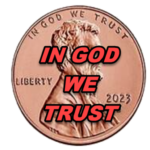
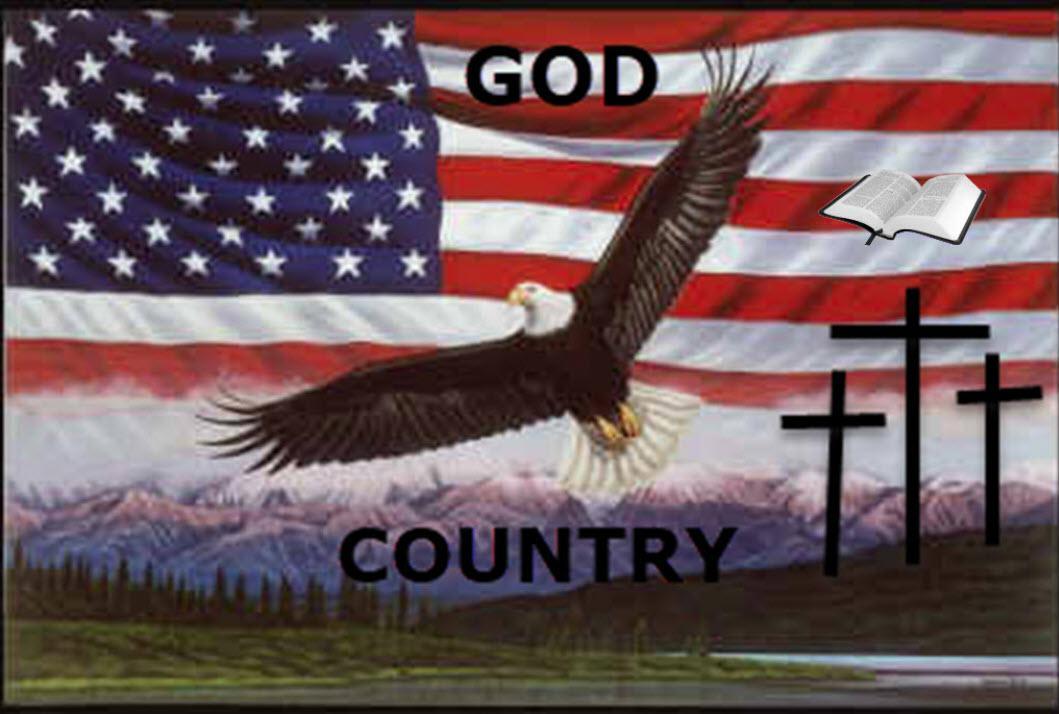
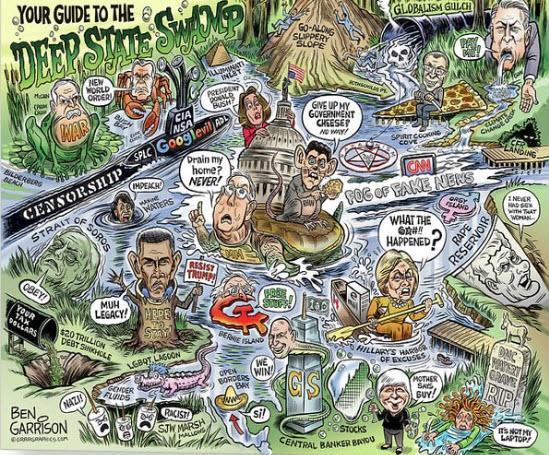
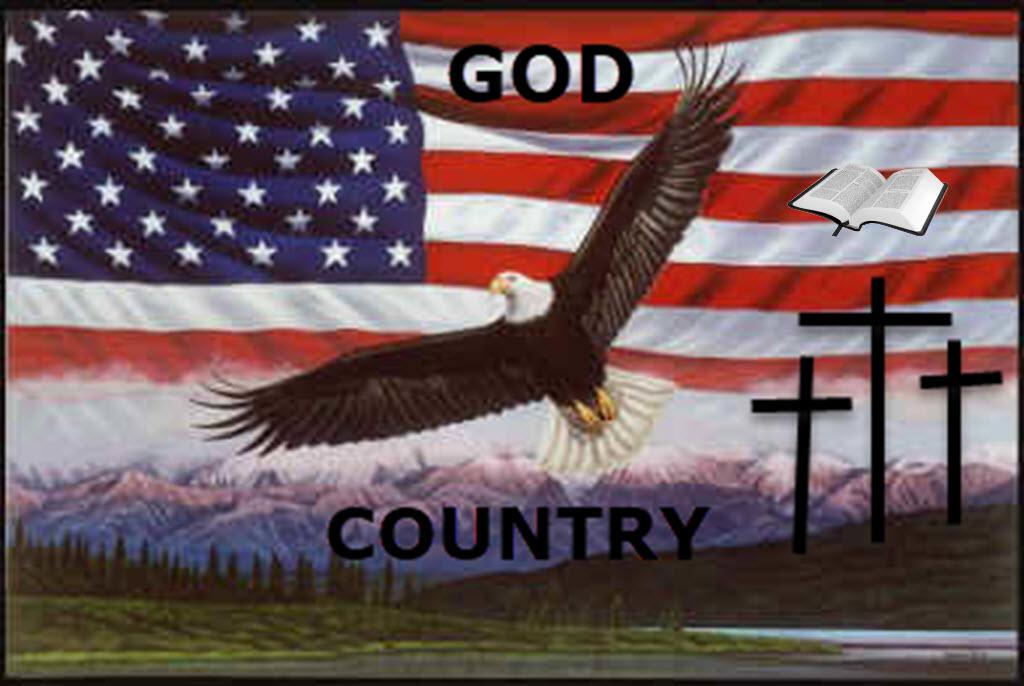
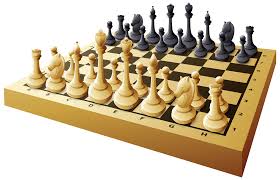
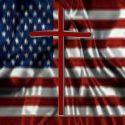
Leave a Reply
You must be logged in to post a comment.